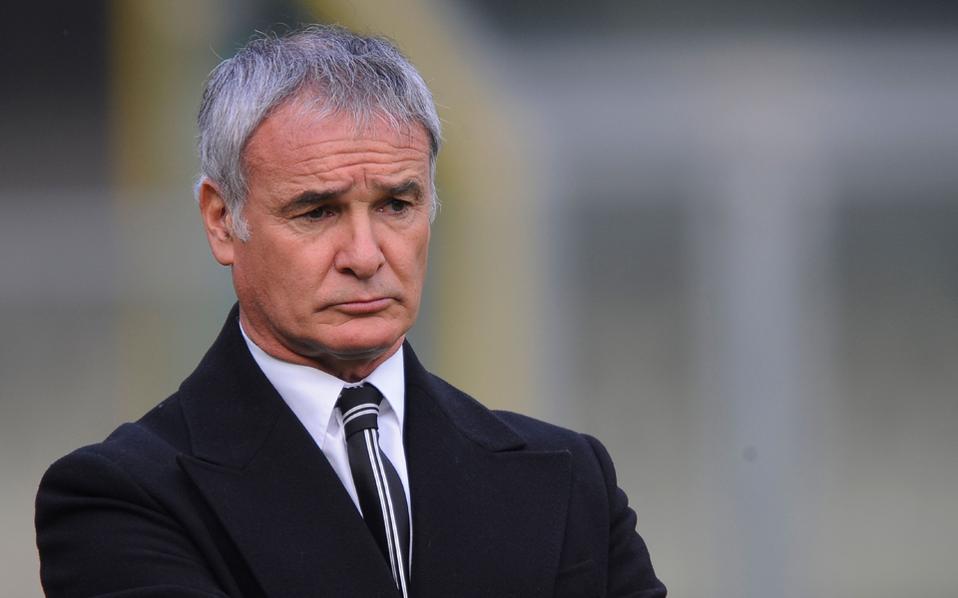Ranieri in Leicester, Ranieri in Greece

Leicester City stands alone at the top of the Premier League with 35 points, having lost only one match in 16. This is a startling achievement for a team that seemed in danger of relegation at one point last season; even more remarkable is the fact that it leads in the richest and toughest league with a manager who just 13 months ago was sacked by Greece’s national team as a total failure. In his short career in Greece, Claudio Ranieri oversaw three defeats and a draw, with the result that the team which won the Euro 2004 competition, which had just competed in the World Cup Finals in 2014, was knocked out of Euro 2016 in the preliminary stage.
I remember Ranieri, dapper in his suit, standing alone and motionless, like a black column, on the sideline at the Karaiskakis Stadium in Piraeus in November 2014 after his team made history by losing to the schoolteachers, bank clerks and lumberjacks of the Faroe Islands. It was a humiliation too far, leaving him no room to stay on in Greece. “Run-ieri,” as a noted Twitter wit put it. The following July he took charge at Leicester City and no one could have predicted that he would achieve so much in so short a time. How did a person who was such a failure in Greece do so well elsewhere?
Let’s not stick to the fact that in other countries we usually find better systems and procedures, and greater discipline, even though these play a decisive role in success or failure. But in soccer there are so many other parameters that we should not be sidetracked by easy conclusions. Perhaps Ranieri’s tenure in Greece was condemned from the start. He took over a team that was exhausted, that had nothing left to give, with many players either at the twilight of their career or still immature, in a campaign overseen by a federation riddled with problems. He succeeded two coaches with significant achievements who had played a very different game. Otto Rehhagel coached Greece to victory in the Euro 2004 and Fernando Santos took the team to the World Cup finals by enforcing discipline at every step, by playing an uncompromising defensive game. Ranieri gave his players greater freedom. But the freedom that allows Leicester City’s Jamie Vardy to break the English record for goals in consecutive matches (11) caused confusion in Greece and contributed to failure. Another significant factor, perhaps, is that Ranieri had never coached a national team before.
Whatever the reasons for Ranieri’s failure, we can draw three conclusions: He was the wrong person for the position, which implies that those who picked him were to blame; he was not incompetent, as we can see from his career before and after Greece; he was not the only member of the national squad who was not up to the task, as we saw from what followed in the Euro preliminaries after he was dismissed, after we had piled all the blame on his shoulders with typical lack of restraint. We can also present a hypothesis: Perhaps the players, the officials and we, the fans, did not try to contribute to the manager’s effort, did not give him the time needed to shape a team and its tactics. After the first defeats we rushed to damn the new coach and did not seek the deeper roots of the problem. Of course it would have helped if Ranieri had looked a little more concerned, had not appeared infuriatingly calm, as he did on the night of the Faroe fiasco, if he had shouted, threatened and sulked, adopting the histrionics requisite for the role. Instead, while the team acted as if it was already condemned, the coach betrayed no sense of urgency, until the cause was lost. In the years of our great melancholy we suffered this additional blow – exit from the top tier of Europe’s teams.
Perhaps the most significant factor in the national team’s loss is that no one tried hard enough. Maybe Ranieri expected a stronger team, when the one that had given us so much joy in the past had lost confidence in itself and the players were waiting for someone to save them rather than making a greater effort themselves. This is how most of us have been for a while now. Since 2010 our country has been in a state of resignation and complaint. Since the signing of the first bailout, we have been awaiting the imposition of new “measures,” which most of us endure stoically while others protest loudly. The second group achieves nothing but creates confusion and the illusion that they know who is responsible for our failure. In soccer we blame the ref, the coach, the other team’s officials. In life, we blame the troika of creditors, the “system,” the “oligarchs,” the “moneylenders.”
When we stop waiting for others to solve our problems, for others to keep us on track, when we realize that we alone are responsible for our fate, when we see the obstacles created by our own unaccountable politicians and state employees, then we will stand on our own feet. Then, perhaps, we will run with the ball and go for goal.




